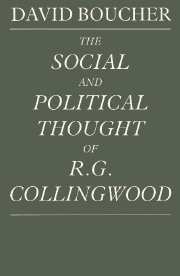Book contents
- Frontmatter
- Contents
- Preface
- 1 Collingwood in context
- 2 The New Leviathan in context
- 3 The two Leviathans and the criteria of rational action
- 4 The development of the European mind
- 5 Collingwood's liberal politics
- 6 The state and the body politic
- 7 The process of civilization
- 8 Conclusion: civilization and its enemies
- Notes
- Index
5 - Collingwood's liberal politics
Published online by Cambridge University Press: 05 June 2012
- Frontmatter
- Contents
- Preface
- 1 Collingwood in context
- 2 The New Leviathan in context
- 3 The two Leviathans and the criteria of rational action
- 4 The development of the European mind
- 5 Collingwood's liberal politics
- 6 The state and the body politic
- 7 The process of civilization
- 8 Conclusion: civilization and its enemies
- Notes
- Index
Summary
Introduction
In the preceding chapter we saw that Collingwood's theory of rational action, discussed in Chapter 3, is the culminating phase of his comprehensive philosophy of mind. At the level of first-order consciousness, feelings and their emotional charges, which are the appanages of mind, are merely registered, without discrimination or differentiation. Feelings are something which the mind has; consciousness is what mind is. By selectively attending to feelings, we enter the second level of consciousness, in which conceptual thought and appetite overlap. At the third level, mind is capable of propositional thinking, which overlaps with desire. At the fourth level, the mind is will, capable at first of making capricious choices and distinguishing between good and evil. The gradual elimination of caprice takes place when mind develops through the three stages of practical and theoretical reason. Each of the levels of practical reason has its concomitant theoretical counterpart: Utility contributes to a view of the world which is teleological; right has its counterpart in modern scientific explanation in terms of the laws of nature and conformity to these laws; and duty, as a form of practical reason, has its theoretical expression in historical explanation.
In this chapter we will begin by examining Collingwood's dissatisfaction with classical political theories and will then go on to explore his theory of society, which he believed supplied the element missing in the classical theories.
- Type
- Chapter
- Information
- The Social and Political Thought of R. G. Collingwood , pp. 141 - 166Publisher: Cambridge University PressPrint publication year: 1989



